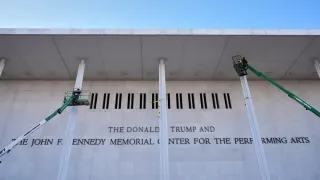February 19, 2017
LGBT SF Synagogue Welcomes Refugees
Matthew S. Bajko READ TIME: 7 MIN.
Pulling out his cellphone, Sergo Adamian quickly hit play on a YouTube video that captured the sea of men attacking a van with LGBT rights activists inside, including him, as it moved through a street in Tbilisi, the capital of the Republic of Georgia. While police officers kept the mob at bay, the vehicle was nonetheless hit with sticks, bottles, and other objects that damaged its windows.
The occupants inside were fleeing from the 40,800 protesters, led by 200 priests from the Georgian Orthodox Church, who showed up to counterprotest the rally Adamian and his colleagues had organized on May 17, 2013 to mark the International Day Against Homophobia. The group of 100 LGBT Georgians and their allies were protected by 3,000 police officers, said Adamian, who escaped injury that day.
"If not for the policemen, for sure we would have all died," recalled Adamian, 27, as he re-watched the chaotic scene. "It was terrifying."
Over the ensuing months Adamian, whose family broke ties with him over his sexual orientation and disbelief in religion, realized that remaining in his home country was untenable. In September 2013 he fled to Kiev, Ukraine where he applied for refugee status through the United Nations High Commissioner for Refugees. It wasn't until April 2015 that he was resettled in the United States, first being placed with a host in West Oakland by Jewish Family and Community Services East Bay.
Since January Adamian has been living in San Francisco's Glen Park neighborhood in the two-bedroom home of Michael Chertok, 53, a gay man who is president of Sha'ar Zahav, the city's predominantly LGBT synagogue. Throughout 2017 the congregation is focusing its social justice work on supporting immigrants and refugees, and a number of its members have offered to open their homes to LGBT refugees.
"I felt, at this particular time, it was something I should do," said Chertok, who is renting out the room to Adamian at a steeply discounted rate for several months, for now, and may extend their agreement if the arrangement continues to work out.
Seated next to Chertok on the couch in the open living room, Adamian explained that he took up the chance to move to San Francisco in order to have a shorter commute to his job with a downtown accounting firm.
Three weeks ago he received his green card, which has provided some relief as Adamian said the election of Donald Trump as president in November was nerve racking.
"I was shocked he won. For me I thought there was zero chance it would happen," he said. "The next four weeks was stressful. I worried what am I going to do and will he kick me out."
He intends to apply for citizenship in 2020, with the hope he will be able to vote in that November's presidential election. He would also like to enroll in graduate school but has been unable to get the paperwork he needs from the university in Georgia from which he graduated, something Chertok has been trying to assist with.
Back in Eastern Europe Adamian owned his own kitchen and bathroom home improvement supply store, a business he would like to someday reopen in the Bay Area.
"I have been to Los Angeles and some other cities, but I like it here more," he said.
Long History of Welcoming Refugees to the Bay Area
It is not the first time that Sha'ar Zahav members have worked to welcome refugees to the country. As Chertok noted in an article he wrote for the congregation's most recent quarterly newsletter, in the 1980s it was part of the sanctuary movement to provide safe haven for Central American refugees fleeing civil conflict in El Salvador and Guatemala.
For many members offering welcome to refugees is inspired by their own familial histories. Members of Chertok's family, for instance, hosted Jews coming from Europe in the late 1930s and early 1940s, including a gay Jewish man.
"They are among my heroes," Chertok, who years ago visited Georgia during a humanitarian trip he took, told the Bay Area Reporter.
Rabbi Ted Riter, a straight man who is serving as the congregation's interim spiritual leader, said Jewish people are innately drawn to assisting immigrants and refugees due to their personal and historical experiences.
"For many of us, our parents, or at least our grandparents, were refugees to this country, fleeing Nazi Germany or the pogroms in the Soviet Union," he said. "We also look back to biblical times; we are continually reminded we are strangers in a strange land. We are counseled over and over again in biblical text that we should take care of the stranger and take care of the people traveling through."
At the congregation's annual leadership meeting in December, which is called an Advance, the members "quickly decided," said Chertok, that with the Trump administration's pledge to crack down on immigration, both legal and illegal, it made sense for them to focus on supporting immigrants and refugees this year.
The congregation also elected to sign on to the Welcome Campaign overseen by HIAS, which was formerly known as the Hebrew Immigrant Aid Society. Started in the late 1800s in New York, HIAS after World War II helped resettle Holocaust survivors to the U.S., as well as to South America and what is now Israel.
Glen Park resident Michael Rice, who joined Sha'ar Zahav with his wife, Jane, in 2012, was a main proponent at the Advance for seeing the congregation work with immigrants and refugees this year. His father, after working in Europe for a decade with the American Jewish Joint Distribution Committee, which assisted Holocaust survivors, became the executive director of HIAS in 1955, where he worked for the next decade.
"Basically, I said welcoming the stranger means helping refugees to me," said Rice. "And I think, to many of us, it is a core value of being Jewish. We've been refugees; we've been persecuted."
The idea for the social justice campaign was prompted from Rice noticing last year that HIAS, through its Welcome Campaign, was asking Jewish congregations around the country to sign up to welcome refugees, and in particular, LGBT refugees.
"I thought, well, this is not my father's HIAS. I like to think he would have come through as well," said Rice, whose family in 1966 moved to Chicago when his father was hired to work for the Jewish Social Services Agency there.
Sha'ar Zahav is now working closely with Jewish Family and Community Services East Bay to support the LGBT refugees it is working to resettle in the Bay Area. The agency is the only one in the country that has developed a specific resettlement program to work with LGBT refugees.
It launched in 2011 when a number of Iranian LGBT refugees, who had fled to Turkey, needed help resettling in the U.S., as the Bay Area Reporter noted in a 2015 article when the agency was known as Jewish Family and Children's Services of the East Bay.
Last August it hired Wade Meyer as the first full-time coordinator of the LGBTI refugee program. At the moment the agency has 13 LGBT refugees in the Bay Area being housed through its program.
Half are from central and east Africa, with the majority from Uganda. Adamian is the only one from Europe and the others hail from Iran and Syria. Members of Sha'ar Zahav are housing three gay refugees at the moment, with others willing to open their homes for new arrivals.
"With congregations like Sha'ar Zahav, we have been able to increase our support and housing," said Meyer, who is working with a number of faith-based groups in the Bay Area to support the LGBT refugees in the program. "Our model, in general, is to work with larger community groups like congregations to help the program overall."
Housing remains the most pressing need, as refugees often arrive with few financial resources in one of the most expensive housing markets in the country.
"A lot of our clients come with only a carry-on bag, so they don't come with a lot of resources," said Meyer. "Certainly, they get food stamps and cash assistance, but it is not nearly enough to pay for rent in the Bay Area. A refugee couldn't get on their feet without a housing host."
The agency also forms welcome groups of up to four people who help each refugee adjust to life in America.
"They practice English with them, help them learn the public transit systems and show them how to shop at the grocery store," explained Meyer. "Sometimes they help sign them up for benefits. They provide support a family or group of close friends would provide."
The East Bay agency normally settles up to 15 LGBT refugees per year. HIAS will alert it three months in advance that a person will be resettled in the Bay Area and again a month out when the person's travel has been arranged.
Prior to Trump's executive order indefinitely putting a hold on accepting more refugees, six LGBT refugees were expected to arrive in the Bay Area between now and May. Due to the court decisions blocking implementation of the ban, one refugee who was supposed to arrive this week was rebooked on an earlier flight and landed last Friday, February 10. He is now living with a host family in Albany.
But Meyer remains unsure on the status of the five other people he had been expecting to arrive by the spring. While they await word on if any more refugees will be allowed into the country, the members of Sha'ar Zahav are focusing on what they can do to assist those already in the Bay Area.
"It is fairly recent, but I can tell you our congregants are very proud to be involved in this. And right now, because of the political scene, we are not sure what is going to happen for the future or if doors are going to shut or open," said Riter. "We see it as a sacred obligation to reach out and open our doors."
The East Bay agency welcomes volunteers willing to host LGBT refugees. Anyone interested in doing so can sign up online at http://jfcs-eastbay.org/volunteer-interest-form/ or can call Meyer at (925) 927-2000, ext. 624






